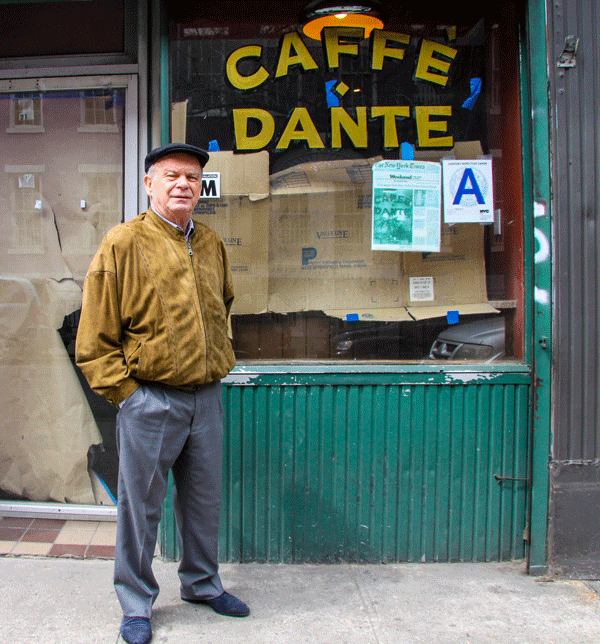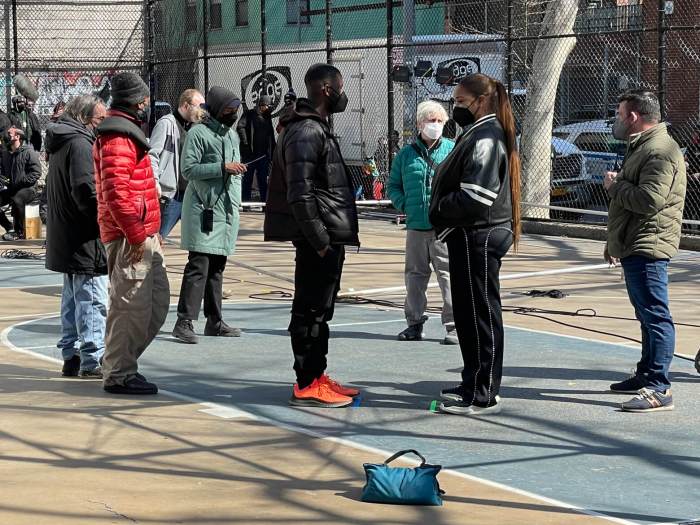
BY SHARON WOOLUMS | Today Villagers walk past closed neighborhood businesses once filled with customers; Union Square Cafe, The Back Fence, Pearl Paint, even Gray’s Papaya — we all had our favorites — gone but not forgotten and greatly missed. We’ve all wondered, “Will the Village as we know it become extinct before anything is done about it?”
Finally, after so many long-established small businesses were forced to close and jobs were lost, solutions are coming.
When the new progressive City Council returns, two different solutions will be considered:
The first, introduced in June by Bronx Councilmember Annabel Palma, the Small Business Jobs Survival Act, gives small business owners — our city’s major job creators and our economy’s backbone — rights equal to landlords in negotiating lease-renewal terms. After bargaining in good faith, if agreement on lease terms can’t be reached, it goes to mediation; if that fails, arbitration. No tax dollars would be needed.
Originally introduced by Councilmember Ruth Messinger in 1986, the S.B.J.S.A. has never had a vote by the full City Council in more than 30 years. Even with the sponsorship of the former chairperson of the Small Business Committee, David Yassky, the entire committee and 32 co-sponsors, the bill was denied a hearing by the Speaker’s Office for more than four years.
The second potential solution was detailed by Robert Cornegy, Jr., chairperson of the Small Business Committee, in a recent Gotham Gazette column. Cornegy wrote that he is “working on legislation using subsidies to pay landlords to not rent-gouge… . I hope that we can create an effective incentive for commercial landlords that will give businesses greater predictability and allow them to benefit from the positive changes they help to create,” he said.
Since the Giuliani administration, and continuing under Mayors Bloomberg and de Blasio, the starting point for most economic policy decisions begins with giving real estate developers tax incentives or subsidies for doing projects claiming to create jobs or benefiting a community. In Cornegy’s proposal, landlords would be given tax breaks for not doing something — for not rent-gouging long established businesses, forcing them to close.
What do small business advocates say is the better solution?
Long recognized as the city’s top authority on the issue, Sung Soo Kim, known as the “Godfather of Small Businesses,” in 1984 founded the Korean American Small Business Service Center, which assists more than 17,000 businesses. Kim was the first chairperson of Mayor Dinkins’s and Giuliani’s Small Business Advisory Committee and a co-founder of the Small Business Congress, a 112-member advocacy group. In 1991, he created the first Small Business Bill of Rights in New York City.
“There is only one real solution to saving our city’s small businesses, the S.B.J.S.A.,” Kim stated. “Our City Council must give job creators — our small businesses — rights to negotiate fair lease terms with landlords, giving them reasonable return for their hard work and investment. If business owners make a reasonable profit and have some control over future costs, they can plan growth, which will create jobs and pay higher wages. Without this right to negotiate equally, where only landlords’ profits count, and only the landlords have all the rights, a take-it-or-leave-it commercial marketplace, the future of every small business and their employees is solely in the hands of a small group of landlords.
“It’s getting worse every year as landlords get greedier demanding ever-more exorbitant rents to gain unreasonable profits,” Kim continued. “Twenty-three percent of my Korean members were forced to close in 2013. As an immigrant business organization, I must say our City Council and mayor are sending the message that New York City is no longer the gateway to the American Dream, especially for immigrant owners.”
Steven Spinola, president of the Real Estate Board of New York, quoted in a Sept. 3 New York Post article, “City Council lease proposal will hurt landlords and city,” clearly stated the landlords’ position on the S.B.J.S.A.
“This is the kind of bill that would send a terrible message to the business community about having arm’s-length transactions between two parties,” he said. “City Council attorneys have suggested in the past, and we still believe, it is not within the scope of the powers of the City of New York, and if it moves ahead, it will be subject to legal challenges.”
The article ended with the recommendation to reject the S.B.J.S.A. before it bursts the city’s economic bubble.
However, Kim responded, “The S.B.J.S.A. will make for better communications between a landlord and business tenant, not less. Years ago, when a lease expired, landlords and tenants met face to face, bargaining in good faith to arrive at fair lease terms which allowed both parties a reasonable profit. Now, little or no bargaining between the landlord and tenant occurs. Business owners receive letters from the landlord’s attorney to accept the terms demanded by the landlord or vacate the premise by the end of the month. They have no certainty of new lease terms, or if the landlord will even want them to stay in business.”
Behind closed doors at City Hall, the S.B.J.S.A.’s legality was questioned, though this was never done publicly. That the bill simply could not work was allegedly “proven” by a “legal review panel” in 2010. Assisted by this so-called “legal roadblock,” a vote on the bill was stopped by friends of the real estate lobby.
In fact, in 1945, the state Legislature passed a strict commercial rent-control law that remained in effect until 1963. This law protected businesses from real estate speculators, greedy landlords and forced closings. New York’s highest courts upheld the law every time as constitutional, and no landlord ever claimed he went out of business during the entire 18 years as a result of being regulated and forced to accept a reasonable return.
Now, with no rights or protections, 185,000 small businesses are at risk and their employees’ jobs in jeopardy. The longer a mom-and-pop store has been in business, the more successful it is, the more money has been put into it, the more at risk it is of being exploited and virtually robbed by landlords. Rent-gouging, extortion, “cash under the table” deals, shorter leases that prevent growth, all result in forced layoffs, higher prices for customers. Small businesses are destroyed as a handful of landlords become super-wealthy. If elected officials really meant it when they say, “Our small businesses are the backbone of our economy, the engines that create jobs,” then why the silence?
Over the past 20 years, our Democratic City Council has used government to maximize and protect the real estate industry’s profits — a partnership producing huge profits for the Council’s major campaign contributor. As small businesses grew weaker each year, their problems were ignored. The real estate industry, having more influence at City Hall, grew stronger as they received every possible tax break and subsidy.
Refusing to appoint a small business owner or advocate to any agency establishing economic policy for small businesses, Mayor de Blasio, though progressive on social issues, clearly is not concerned about small businesses and jobs. More than 53,200 commercial evictions were issued and 160,000 businesses closed during Bloomberg’s 12-year term. De Blasio, appointing the same people and taking the same position as Bloomberg, said the major problems facing small businesses were “excessive fines and lack of affordable loans,” never mentioning rent-gouging, illegal extortion or action to stop the closings and save jobs.
Why would anyone want to start a business in this city without any built-in predictability of success? Stores do come and go now quickly, but we all know nothing can replace the patina of the tried and true. No matter what side you’re on, political, aesthetic, sentimental, whatever, we can all agree that we are losing the Village, Chinatown, Little Italy…our distinctive neighborhoods that we knew and loved.
No need for preaching to the choir. Many voices, sing perhaps a different tune, but ending on the same note: We all want our Village back safe and secure.
Of the small businesses interviewed for this article, one merchant’s response struck a chord that resonates with many. The owner of a successful West Village restaurant, she wishes to remain anonymous — like most, in fear of retaliation upon lease renewal.
“December, the fate of my 30-year-old Greenwich Ave. restaurant will be decided when its lease expires,” she said. “With exorbitant rents demanded by landlords, several businesses already closed in surrounding blocks, we are fearful for the future of our own establishment. We need help in negotiating fair lease terms to level the playing field with our landlords. If I do not get lease terms allowing me a reasonable profit, I will have to close my business and walk away from 30 years of hard work.
“How many more banks and Duane Reades can we cram in before no one comes here anymore?” she asked desperately. “Everyone you talk to hates what is happening. We are standing by watching the literal destruction of the capital city of the world — the city dreams are made of. No more can you have a good idea and become an entrepreneur. Most people don’t realize tenants pay huge portions of the buildings’ out-of-control real estate taxes, adding thousands of dollars a year in expenses— another reason so many small shops are gone.
“If I reject the lease terms and close my business,” she continued, “the landlord will not care if it remains empty for years because they can get a tax deduction for loss of income. Great for the landlord, destructive to everyone else. Empty space is not generating jobs, sales and payroll tax or attracting people to neighborhoods. Something must be done or there will be nothing left, and those rich people in luxury apartments will wonder why they moved to such a boring, unsexy city.”
Myriad, long-favored establishments have disappeared before our disbelieving eyes; distinctive colorful neighborhoods faded into a gray sea of mediocrity — the bitter end of a trickle-down economy at its worst. Mayor de Blasio thinks “trickle-down” creates jobs. Except it never does “trickle” past the corrupt political machine. And when it rains, it pours — profits into the pockets of greedy landlords taking advantage of a situation because “they can.”
Renowned economist Robert Reich aptly frames it: “The moral crisis of our age [is] corporate payoffs to friendly politicians…and the billionaire takeover of our democracy.”
Bottom-up or top-down, advocates, the choice is yours but no longer can we afford to ignore the obvious.
For this article, Councilmember Annabel Palma, who introduced the S.B.J.S.A. into the Council in June, was interviewed, along with local politicians.
Villager: Why do you feel your bill is the best solution to stopping the closing of small businesses and saving jobs?
Palma: The S.B.J.S.A. would help facilitate and cultivate a fair negotiating environment, which would result in more reasonable leasing terms to help small businesses thrive, and encourage job retention and growth in the city of New York.
Villager: Have you resolved ‘legal concerns’ expressed by the city’s Legal Department?
Palma: This bill has been circulated within the Council for decades and has been analyzed and vetted by some of the most seasoned and competent lawyers I know. It is perhaps the most scrutinized bill put before the Council. As a result, I believe this bill is legally sound and viable. Arguments to the contrary, I sincerely feel, are wrong.
Keen Berger, Village Democratic district leader: I favor the S.B.J.S.A. It seems necessary to level the playing field. I hate to make more laws, but this one seems essential.
Councilmember Corey Johnson (not a sponsor of the S.B.J.S.A.): A variety of approaches need to be embraced to ensure the continued vitality of the small businesses that give New York City and its neighborhoods their distinct character and communities, and so I support commercial rent regulation. I applaud the creativity of my colleagues in developing various legislative mechanisms to preserve the local jobs and economies provided by these long-established businesses.
Councilmember Margaret Chin is a sponsor of the S.B.J.S.A., but did not respond to the survey questions.
Councilmember Rosie Mendez sponsored the S.B.J.S.A. in 2010, but is not a sponsor of the current S.B.J.S.A. She did not respond to survey questions.

















